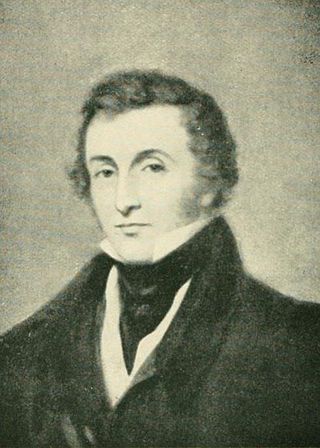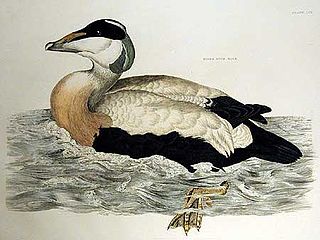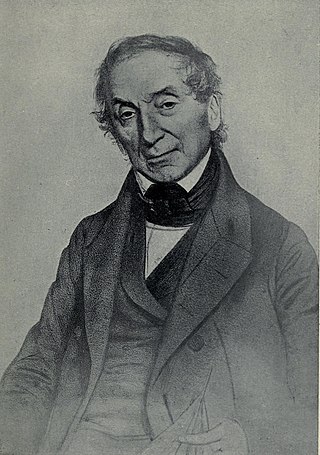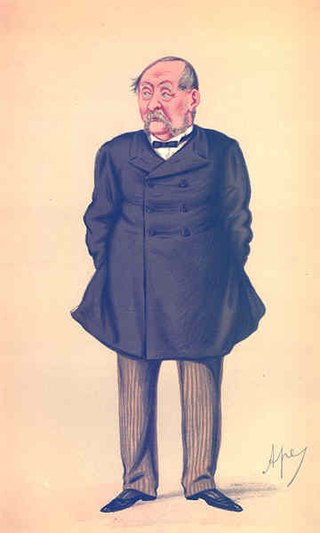Related Research Articles

The Penny Black was the world's first adhesive postage stamp used in a public postal system. It was first issued in the United Kingdom on 1 May 1840 but was not valid for use until 6 May. The stamp features a profile of Queen Victoria.

Fordingbridge is a town and broader civil parish with a population of 6,000 on the River Avon in the New Forest District of Hampshire, England, near the Dorset and Wiltshire borders and on the edge of the New Forest, famed for its late medieval seven-arch bridge.
The Penny Post is any one of several postal systems in which normal letters could be sent for one penny. Five such schemes existed in the United Kingdom while the United States initiated at least three such simple fixed rate postal arrangements.

Sir William Jardine, 7th Baronet of Applegarth FRS FRSE FLS FSA was a Scottish naturalist. He is known for his editing of a long series of natural history books, The Naturalist's Library.

Prideaux John Selby FRSE FLS was an English ornithologist, botanist and natural history artist.

Nathaniel Wolff Wallich was a surgeon and botanist of Danish origin who worked in India, initially in the Danish settlement near Calcutta and later for the Danish East India Company and the British East India Company. He was involved in the early development of the Calcutta Botanical Garden, describing many new plant species and developing a large herbarium collection which was distributed to collections in Europe. Several of the plants that he collected were named after him.

Sir William Robert Seymour Vesey-FitzGerald, GCSI, GCIE, PC, was an Anglo-Irish politician and colonial administrator. He served as Under-Secretary of State for Foreign Affairs between 1858 and 1859 and as Governor of Bombay between 1867 and 1872.

The 55th Regiment of Foot was a British Army infantry regiment, raised in 1755. After 1782 it had a county designation added, becoming known as the 55th (Westmorland) Regiment of Foot. Under the Childers Reforms it amalgamated with the 34th (Cumberland) Regiment of Foot to form the Border Regiment in 1881.

Acton Smee Ayrton was a British barrister and Liberal Party politician. Considered a radical and champion of the working classes, he served as First Commissioner of Works under William Ewart Gladstone between 1869 and 1873. He is best remembered for the "Ayrton controversy" over scientific facilities at Kew Gardens.

Edmund Prideaux of Forde Abbey, Thorncombe, Devon, was an English lawyer and Member of Parliament, who supported the Parliamentary cause during the Civil War. He was briefly solicitor-general but chose to resign rather than participate in the regicide of King Charles I. Afterwards, he was attorney-general, a position he held until he died. During the Civil War and for most of the First Commonwealth he ran the postal service for Parliament.

John Prideaux was an English academic and Bishop of Worcester.

Walter Prideaux was a poet and lawyer. Prideaux rose to be clerk to Goldsmiths' Hall. He was involved in record setting balloon flight.

Alfred John Kempe was an English antiquary.
John Mitford (1781–1859) was an English clergyman and man of letters.
Sir George Best Robinson, 2nd Baronet was a British colonial administrator who became Chief Superintendent of British trade in China.
The 1895 New Year Honours were appointments by Queen Victoria to various orders and honours to reward and highlight good works by members of the British Empire. They were published on 1 January 1895.

The Devon and Cornwall Bank was a bank which operated in the Westcountry of England between 1832 and 1906, when it was taken-over by Lloyds Bank.

Fairlie was launched at Calcutta in 1810 and sailed to England. There she became a regular ship for the British East India Company (EIC). Including her voyage to England, she made four voyages for the EIC. From around 1821 on she became a Free Trader, continuing to trade with India under a license from the EIC. She also made two voyages transporting convicts to New South Wales (1834), and Tasmania (1852). She made several voyages carrying immigrants to South Australia, New South Wales, and British Guiana. She foundered in November 1865.

Major-General Sir Evan John Murray-Macgregor of Macgregor, 2nd Baronet, was a Scottish colonial administrator and senior British army officer.
William Prideaux Courtney (1845–1913) was a British biographer and civil servant. Writing as W. P. C., he was a contributor to the first edition of the Dictionary of National Biography. He was the brother of Leonard Courtney, 1st Baron Courtney of Penwith (1832-1918) and John Mortimer Courtney (1838–1920). As an administrator he worked for the Ecclesiastical Commissioners.
References
- ↑ Phillips, Carl; Simpson, St J. (2007). "A biographical sketch of Britain's first Sabaeologist — Colonel W.F. Prideaux, CSI". Proceedings of the Seminar for Arabian Studies. 37: 201–218. ISSN 0308-8421. JSTOR 41224067.
- ↑ Buckland, C. E. (1971). Dictionary of Indian Biography. Ardent Media. p. 343.
- 1 2 3 4 "Collections Online | British Museum". www.britishmuseum.org. British Museum. Retrieved 1 December 2023.